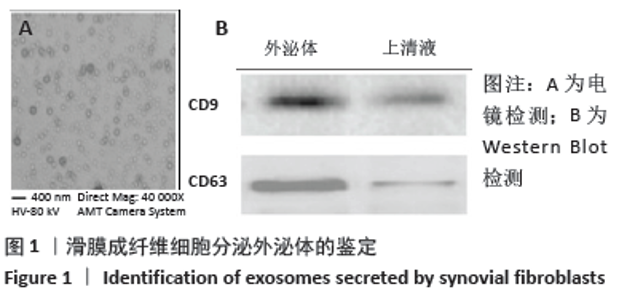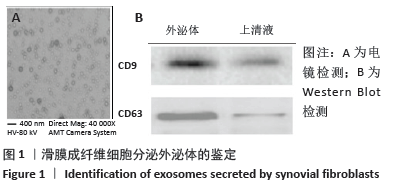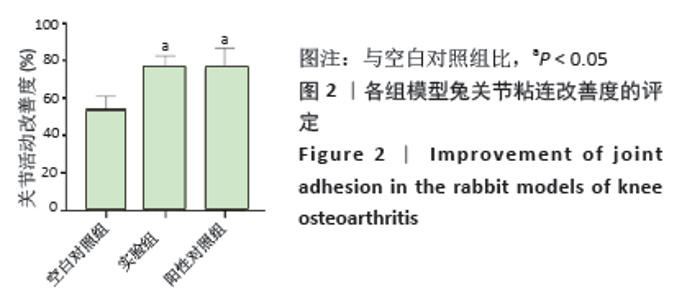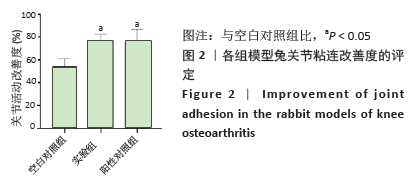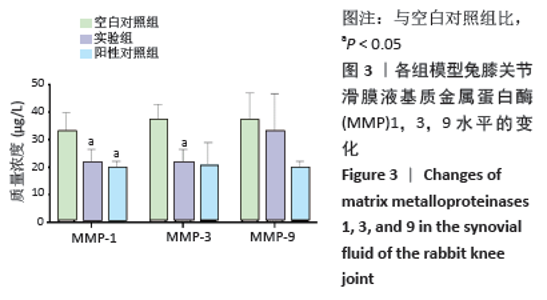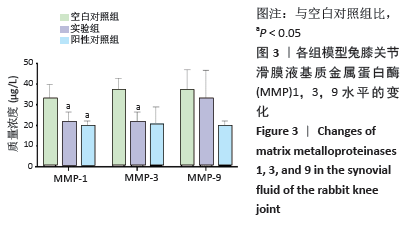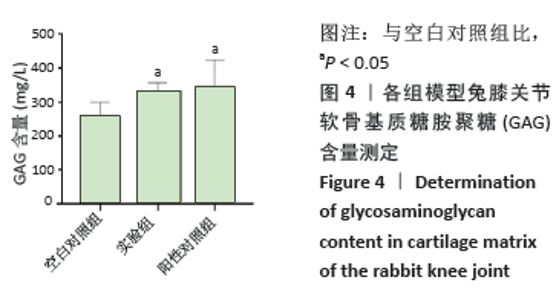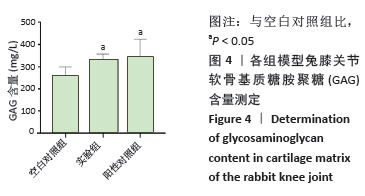[1] BERENBAUM F. Osteoarthritis as an inflammatory disease (osteoarthritis is not osteoarthrosis!). Osteoarthr Cartilage. 2013;21(1):16-21.
[2] CROSS M, SMITH E, HOY D, et al. The global burden of hip and knee osteoarthritis: estimates from the Global Burden of Disease 2010 study.Ann Rheum Dis. 2014;73(7):1323-1330.
[3] GREENE MA, LOESER RF. Aging-related inflammation in osteoarthritis. Osteoarthr Cartilage. 2015;23(11):1966-1971.
[4] MOBASHERI A, BAY-JENSEN AC, VAN SPIL WE, et al. Osteoarthritis Year in Review 2016: biomarkers (biochemical markers). Osteoarthr Cartilage. 2017;25(2):199-208.
[5] HEDBOM E, HAUSELMANN HJ. Molecular aspects of pathogenesis in osteoarthritis: the role of inflammation. Cell Mol Life Sci. 2002;59(1): 45-53.
[6] SCHULZE-TANZIL G, ZREIQAT H, SABAT R, et al. Interleukin-10 and articular cartilage: experimental therapeutical approaches in cartilage disorders. Curr Gene Ther. 2009;9(4):306-315.
[7] 贺占坤,沈杰威. MMP-2、MMP-3、MMP-9和 TIMP-1评价膝关节骨性关节炎的临床研究[J].重庆医学,2013,42(32):3872-3874.
[8] SAMUEL M, BLEACKLEY M, ANDERSON M, et al. Extracellular vesicles including exosomes in cross kingdom regulation: A viewpoint from plant-fungal interactions. Front Plant Sci. 2015;6:766.
[9] C LARK ES, WHIGHAM AS, YARBROUGHWG, et al. Cortactin is an essential regulator of matrix metalloproteinase secretion and extracellular matrix degradation in invadopodia. Cancer Res. 2007;67: 4227-4235.
[10] WIESNER C, FAIX J, HIMMEL M, et al. KIF5B and KIF3A/KIF3B kinesins drive MT1-MMP surface exposure, CD44 shedding, and extracellular matrix degradation in primary macrophages. Blood. 2010;116:1559-1569.
[11] 高晓燕,王大为,李发美,等.牛膝提取物对成骨样细胞增殖的作用[J].沈阳药科大学学报,2000,17(3):210-213.
[12] 陈达,廖州伟,马笃军,等.牛膝醇提物对兔骨关节炎模型的疗效比较[J].中国医药导报,2016,13(25):21-24.
[13] 曾俊华,马笃军,彭力平,等.实验兔膝骨关节炎模型的建立及鉴定[J].中国临床研究,2016,29(5):679-682.
[14] SCANZELLO CR, GOLDRING SR. The role of synovitis in osteoarthritis pathogenesis. Bone. 2012;51(2):249-257.
[15] 姚共和,刘向前,李建斌,等.中医期刊治疗膝关节骨关节炎方剂用药特点分析[J].湖南中医学院学报,2005,25(6):54-56.
[16] 沈舒,王琼,李友宾.牛膝的化学成分和药理作用研究进展[J].海峡药学,2011,23(11):1-6.
[17] 肖伟,林栋栋,彭力平.牛膝醇提物透入疗法对膝骨性关节炎的疗效观察[J].中国中医骨伤科杂志,2015,23(8):37-40.
[18] KONTTINEN YT, AINOLA M, VALLEALA H, et al. Analysis of 16 different matrix metalloproteinases (MMP-1 to MMP-20) in the synovial membrane: different profiles in trauma and rheumatoid arthritis. Ann Rheum Dis. 1999;58(11):691-697.
[19] ROSINI S, PUGH N, BONNA AM, et al.Thrombospondin-1 promotes matrix homeostasis by interacting with collagen and lysyl oxidase precursors and collagen cross-linking sites. Sci Signal. 2018;11(532): eaar2566.
[20] LU P, WEAVER VM, WERB Z. The extracellular matrix: A dynamic niche in cancer progression. J Cell Biol. 2012;196:395-406.
[21] TARABOLETTI G, D’ASCENZO S, BORSOTTI P, et al. Shedding of the matrix metalloproteinases MMP-2, MMP-9, and MT1-MMP as membrane vesicle-associated components by endothelial cells.Am J Pathol. 2002;160(2):673-680.
[22] MATEESCU B, KOWAL EJ, VAN BALKOM BW, et al. Obstacles and opportunities in the functional analysis of extracellular vesicle RNA - an ISEV position paper. J Extracell Vesicles. 2017;6:1286095.
[23] HAKULINEN J, SANKKILA L, SUGIYAMA N, et al. Secretion of active membrane type 1 matrix metalloproteinase (MMP-14) into extracellular space in microvesicular exosomes. J Cell Biochem. 2008;105:1211-1218.
[24] HAN KY, DUGAS-FORD J, SEIKI M, et al. Evidence for the Involvement of MMP14 in MMP2 Processing and Recruitment in exosomes of Corneal Fibroblasts. Invest Ophthalmol Vis Sci. 2015;56:5323-5329.
[25] LOZITO TP, TUAN RS. Endothelial cell microparticles act as centers of matrix metalloproteinsase-2 (MMP-2) activation and vascular matrix remodeling. J Cell Physiol. 2012;227:534-549.
[26] KOECK ES, IORDANSKAIA T, SEVILLA S, et al. Adipocyte exosomes induce transforming growth factor beta pathway dysregulation in hepatocytes: A novel paradigm for obesity-related liver disease. J Surg Res. 2014;192:268-275.
[27] SANDERSON RD, BANDARI SK, VLODAVSKY I. Proteases and glycosidases on the surface of exosomes: Newly discovered mechanisms for extracellular remodeling. Matrix Biol. 2017;75-76:160-169. |
